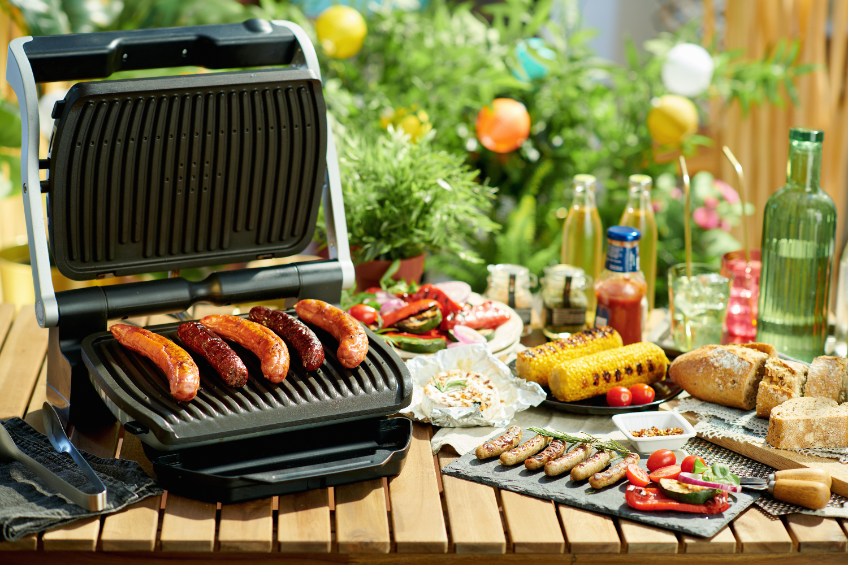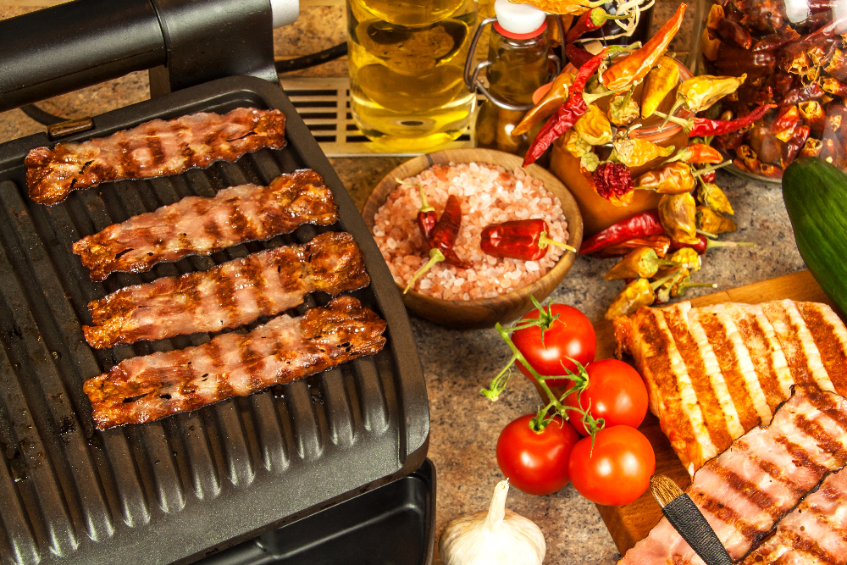This content has been archived. It may no longer be relevant

When it comes to outdoor cooking, gas grills dominate the market.
When most people consider an alternative, it’s charcoal.
But there is a third option.
An electric grill makes sense in several scenarios and many people prefer grilling with an electric appliance rather than one that uses combustible fuel.
What is the point of an electric grill, and should you consider one for your home?
Let’s look at the benefits and find out if going electric is worth it.
How Does an Electric Grill Work?

An electric grill, also known as an electric barbecue or electric griddle, is a kitchen appliance that uses electricity to generate heat for cooking food.
It typically consists of a heating element, a cooking surface, and controls for temperature and power.
Here’s how an electric grill works.
Heating Element
The electric grill has a heating element, usually made of metal, that is responsible for generating heat.
When the grill is plugged into an electrical outlet and turned on, electricity flows through the heating element, which then heats up.
Cooking Surface
The cooking surface of an electric grill is typically made of materials such as cast iron, stainless steel, or non-stick coated plates.
The heated cooking surface provides the direct contact between the food and the heat source, allowing the food to cook.
Temperature Control
Electric grills typically have a temperature control feature that allows you to set the desired cooking temperature.
The heating element heats up to the set temperature, and the food is cooked accordingly.
Some electric grills may also have multiple heat zones or adjustable temperature settings for different cooking requirements.
Power Control
Electric grills also have a power control feature that allows you to adjust the power output of the heating element.
This can help you regulate the intensity of the heat and control the cooking process to achieve the desired results.
Cooking Process
Once the electric grill is preheated to the desired temperature, you place the food on the cooking surface.
The heated surface then cooks the food by direct contact, searing and browning the food as it cooks. You can flip or turn the food as needed to ensure even cooking.
Safety Features
Electric grills usually come with safety features such as heat-resistant handles, non-slip feet, and automatic shut-off timers to prevent accidents and ensure safe operation.
Cleaning
After cooking, the electric grill needs to be cleaned.
The cooking surface can usually be easily wiped down with a damp cloth or sponge, and some models may have removable plates that can be washed separately.
It’s important to follow the manufacturer’s instructions for cleaning and maintenance.
Overall, an electric grill works by using electricity to generate heat in a heating element, which then heats the cooking surface where food is placed for cooking.
The temperature and power controls allow you to adjust the cooking process, and safety features ensure safe operation.
Electric grills are popular for indoor and outdoor cooking due to their convenience, ease of use, and versatility.
What are the Advantages of an Electric Grill?

Electric grills offer several advantages, which make them a popular choice for cooking indoors or outdoors.
Here are some of the key advantages of electric grills.
Convenience
One of the main advantages of electric grills is their convenience.
They are easy to use and require minimal setup compared to other types of grills, such as charcoal or gas grills.
Electric grills typically have simple controls for temperature and power, making them user-friendly, and they can be used in a variety of locations, including indoor kitchens, balconies, and small outdoor spaces.
Safety
Electric grills are generally considered safer than charcoal or gas grills.
They do not produce open flames or release harmful gases, such as carbon monoxide or propane, making them safer to use indoors or in enclosed spaces.
Electric grills also typically have safety features such as heat-resistant handles, automatic shut-off timers, and non-slip feet, which help prevent accidents and ensure safe operation.
Cleanliness
Electric grills are relatively easy to clean compared to charcoal or gas grills.
Many electric grills have non-stick coated cooking surfaces or removable plates that can be washed separately, making cleanup a breeze.
Electric grills also do not produce ash or soot like charcoal grills, reducing the mess and making them more convenient for indoor use.
Versatility
Electric grills are versatile and can be used to cook a wide range of foods, including meats, vegetables, seafood, and more.
They can be used for grilling, searing, sautéing, and even baking, depending on the model and cooking surface.
Some electric grills also offer adjustable temperature settings or multiple heat zones, allowing you to cook different types of food simultaneously.
Energy Efficiency
Electric grills are generally considered more energy-efficient than charcoal or gas grills.
They typically heat up quickly and can maintain a consistent temperature, reducing the need for excess energy consumption.
Electric grills also do not require fuel, such as charcoal or propane, which can save on ongoing costs.
Indoor Use
One significant advantage of electric grills is that they can be used indoors, making them ideal for those who live in apartments, condos, or areas with restrictions on outdoor grilling.
Electric grills do not produce smoke or fumes, making them a viable option for indoor cooking without worrying about ventilation or smoke detectors.
No Flare-ups
Unlike charcoal or gas grills, electric grills do not produce flare-ups, which are sudden bursts of flame that can burn the food and cause uneven cooking.
Electric grills provide consistent heat without flare-ups, resulting in more controlled cooking and better results.
Overall, electric grills offer convenience, safety, cleanliness, versatility, energy efficiency, and indoor use advantages, making them a popular choice for many households.
However, it’s important to consider your specific cooking needs and preferences when choosing a grill and follow the manufacturer’s instructions for safe and proper use.
The Best Electric Grills
There is a growing number of electric grills on the market today, but two models, in particular, stand out from the rest.
The Weber Q1400 is the best premium electric grill. It has 189 square inches of cooking area and porcelain enamel cooking grates. With exposed heating elements, this grill can produce an authentic smoky flavor.
The George Foreman 12+ Servings Electric Grill is a popular product that combines value and performance. It features a solid cooking surface that channels excess fat away from food. With a removable stand, it can be used outdoors like a traditional grill, or indoors on a tabletop or counter.
An Electric Grill Could be Perfect for Your Needs
 In conclusion, electric grills can be a perfect option for those who need a convenient, safe, and versatile grilling solution, especially for indoor or limited outdoor space cooking.
In conclusion, electric grills can be a perfect option for those who need a convenient, safe, and versatile grilling solution, especially for indoor or limited outdoor space cooking.
They are easy to use, clean, and maintain, and offer energy efficiency and safety features. If these advantages align with your specific needs, an electric grill could be a suitable choice for you.
However, it’s always important to consider your own preferences, cooking requirements, and follow the manufacturer’s instructions for safe and proper use of any grill.

